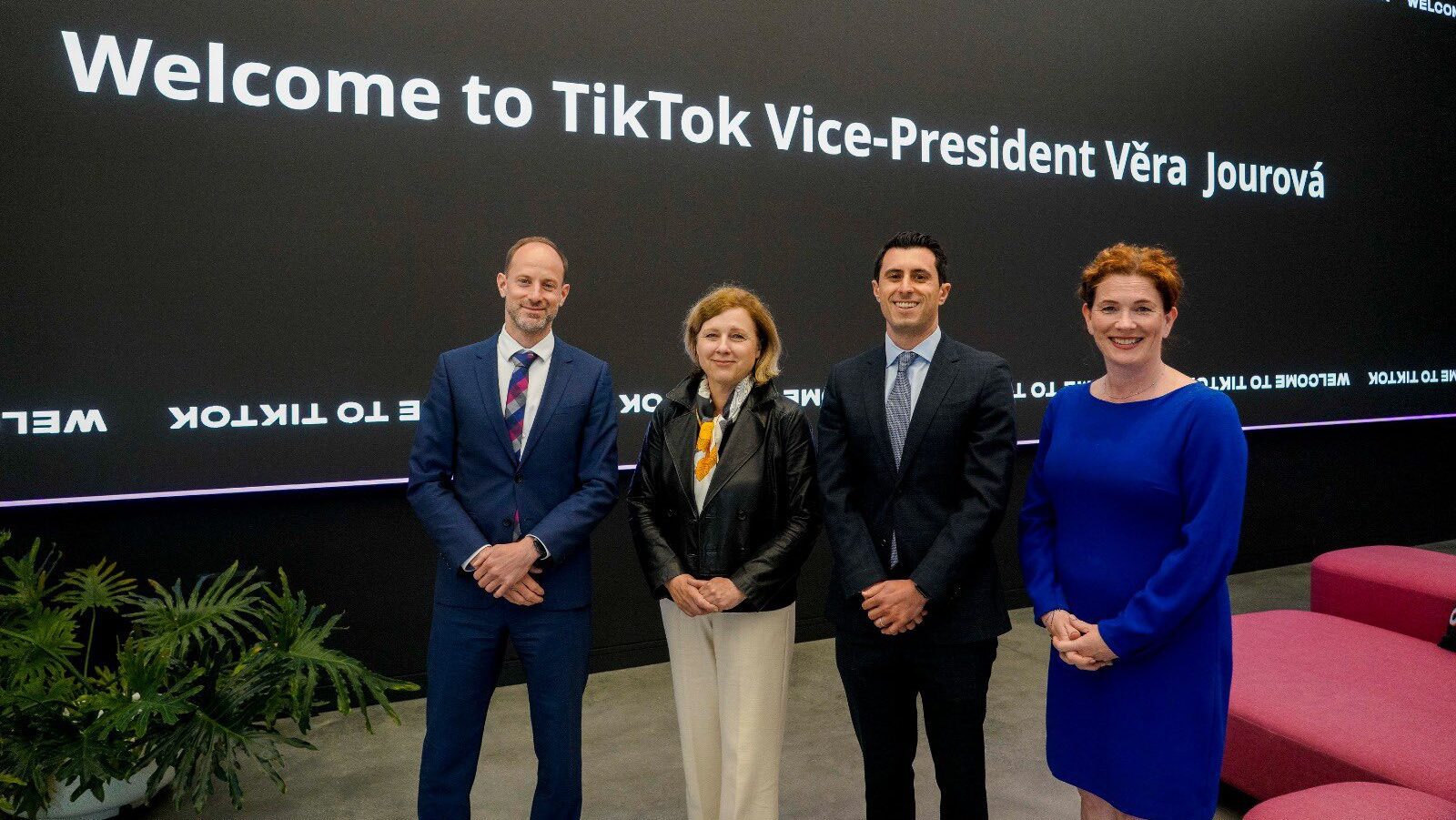
Transparency Commissioner Věra Jourová visiting TikTok
Photo: @VeraJourova on X, 29 May, 2024.
One of the European Commission’s most senior officials, Transparency Commissioner Věra Jourová, is spending the week lobbying the CEOs of major U.S. tech firms, hoping to ensure Brussels’ control of the online political narrative during next week’s European Union elections and beyond, with an additional eye to regulating artificial intelligence (AI) technology.
“She’s not just on an EU-funded trip for the sunshine; she’s there to put pressure on Big Tech to further control what can be said online,” claimed the Brussels-based think tank MCC Brussels, warning that Jourová’s primary reason for visiting Silicon Valley was controlling the political narrative—not promoting innovation.
Already notorious for her attacks on Hungary and Poland, Czech-born Commissioner Věra Jourová made the visit across the water to personally discuss the looming election with TikTok, Twitter, YouTube, and even Netflix. Brussels is beginning to flex its muscles based on new anti-free speech legislation, including the Digital Services Act (DSA).
Legal instruments such as the DSA are designed to fine major platforms for non-compliance with EU ‘hate speech’ laws. Meanwhile, the newly approved AI Act has inbuilt ‘anti-racist’ clauses, including preventing the new technology from being used for border control. Such measures are all part of Brussels’ toolkit, designed to regulate speech and American enterprises alike.
The centrepiece of the meetings was inspecting Silicon Valley’s preparations for next week’s European elections. Jourová made specific efforts to meet with TikTok’s American CEO Shou Chew. The success of TikTok in attracting youthful audiences to right-wing populism has angered Brussels in recent months, with the EU following Washington by applying restrictions on the Chinese-run platform—justified with reference to espionage. Meanwhile, EU parliamentarians have been using the “evil tool for a good purpose” in their election campaigns—according to a spokesperson, “to fight disinformation and get the message across.”
Having deployed ‘lawfare’—under the guise of ‘democracy’ and ‘European values’— against the governments of Poland, Hungary, and more recently Slovakia, Jourová’s visit to California is another part of her so-called ‘democracy tour.’ In a speech to the Brussels-based think tank Bruegel, the veteran Eurocrat directly linked her visits to a clampdown on right- and left-wing populism. Potential EU funding for ideologically approved media outlets, the impact of AI-generated deepfake videos on elections, and the thorny issue of AI regulation were all on the agenda for Jourová’s Californian visit.
This included a one-on-one with Twitter CEO Linda Yaccarino, whose platform faces legal proceedings from the EU over a failure to curtail ‘disinformation.’ The pro-free-speech attitude of Twitter’s new owner Elon Musk has undermined EU attempts to regulate the internet. Ironically, European powers depend upon the South African billionaire to manage both their space programme and green transition (the latter due to Tesla’s dominance in electric battery manufacturing).
Despite a formal requirement to stay out of party politics, the Czech commissioner used a March speech to criticise recent election results in Finland and Slovakia. Populist advances like these are a major motivation not just for pressuring Big Tech to regulate elections ‘correctly,’ but also for launching European efforts to ‘fight disinformation.’
“I think the governments and experts can do it much better on the ground than the platforms in the Silicon Valley,” Jourová said.
EU efforts to monitor social media were strengthened by member state approval this week of ‘hybrid rapid response teams,’ specifically structured to combat populist narratives on Ukraine and migration.
Pioneered by Poland as a way to combat Russian disinformation operations and directly linked to EU defence strategy, these new ‘hybrid rapid response teams’ consist of carefully selected ‘experts’ able to be deployed to an individual member state upon request, and already operating within NATO.
Narratives about Russian bots and AI-generated deepfakes (and even comic books) are providing a veneer of legitimacy to the EU’s anti-populist policies this election cycle.
What is a ‘deepfake’?
Deepfakes are created when an image or recording is altered and manipulated to misrepresent an individual’s words or actions. As with earlier airbrushing and digital imaging (‘Photoshopping’), a key concern is that the materials can pass for real and convince viewers or listeners of their truthfulness. In turn, it is asserted that suitably composed materials could have a decisive effect on public opinion or voter behaviour.
Jourová and her fellow Eurocrats have increased their oversight of free expression online due to this perceived threat, with each EU member state required to have a ‘digital coordinator’ to implement censorship upon request, under the terms of the DSA.
Brussels aims to outsource most of the heavy lifting to platforms themselves, which face fines for non-compliance—as Facebook already knows to its cost.
This is not the first time the EU has gone stateside to twist the arms of American companies. Previously, Jourová’s Commission counterpart Thierry Breton went to Silicon Valley in June 2023, reading Elon Musk the riot act over EU hate speech codes.
The next few weeks will be a major testing ground for EU censorship rules with Eurocrats using every crisis to advance a preconceived technocratic agenda to regulate platforms and public expression for the sake of a wider political project.
